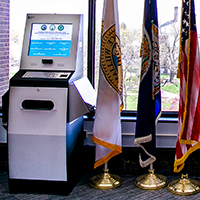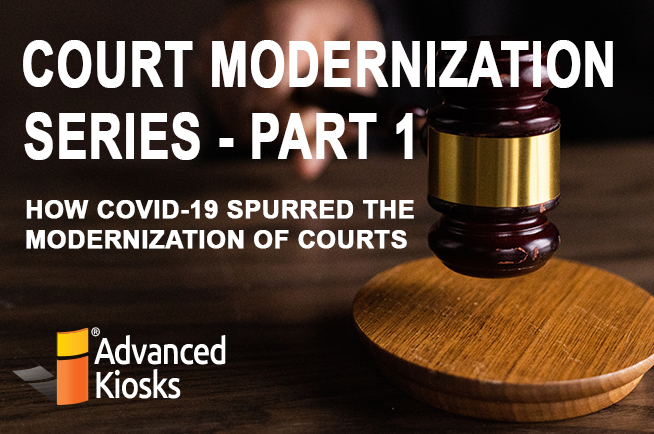The court system in the United States is undergoing dramatic changes as part of an effort to cut costs, reduce face-to-face contact and provide more efficient services.
To help explain those changes and outline ways to spur courthouse modernization, Advanced Kiosks is producing a series looking at the challenges of courthouse modernization and how implementing self-service kiosks can help address those challenges.
Although many of the changes implemented at the beginning of the pandemic are going away, some will be with us for a long time, if not for good. And while some court proceedings will continue to be held in a face-to-face setting, others will be accomplished via technological tools.

A 2021 Thomson Reuters Institute study, The Impacts of the Pandemic on State & Local Courts, surveyed approximately 240 court professionals ranging from judges to clerks at the state, county, and municipal courts level, and found several common denominators. Nearly every court (93%) moved to some form of remote proceedings to continue operations and the height of the pandemic, and most (89%) are continuing to use some form of remote proceedings.
The study arrived at several conclusions regarding the future of technology and the legal system. Courts should continue to find ways to provide more technological help to litigants, particularly self-represented parties.
“Without equal and fair access to our courts, individuals risk the loss of their liberty, property, and much more,” the study authors wrote. “When citizens do not have the same access to knowledge of their rights or an understanding of courts’ processes, we are left with a weakened and unbalanced justice system. The technology changes we have seen accelerating over the past 18 months are a positive step forward for court professionals and our nation’s citizens.”
One of the immediate benefits of technology in the courts was an improved participation rate. A project conducted by the Pew Research Center, for example, found that Arizona civil courts saw an 8% year-over-year drop in June 2020 in the rate of default judgments due to defendants failing to appear in court. Officials from across the country, including judges, administrators, and attorneys, are reporting increases in civil court appearance rates, Pew found.
Still, while modernization of the court system with technology is improving access for litigants, not everyone is reaping the benefits. Although defendants have the right to legal counsel in criminal courts, no such rights exist for this in civil court proceedings. Those without legal representation, especially those with disabilities and/or limited English proficiency, continue to face significant disadvantages, Pew found. A lack of a computer or high-speed Internet access can create a significant hurdle for those trying to access the courts with technology.
Because of those issues, an on-site technological method of accessing courthouse services will be a key part of any courthouse modernization effort.
Up next in the Court Modernization Series: Process Simplification with eFiling in Modern Courts
Advanced Kiosks has for nearly 20 years been a leader in developing self-service solutions for many areas where we conduct business, and courthouses are no exception.
Our products make it easy for citizens to check in to appointments with probation officers, file legal documents, apply for permits and perform a host of other court-related functions.
Contact us today to see how we can assist in your courthouse modernization efforts.

